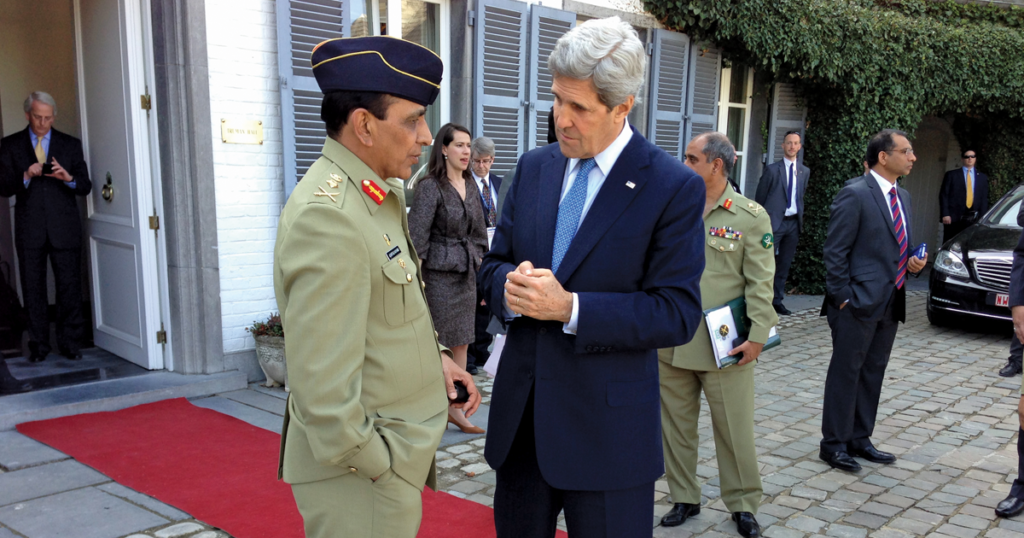
Directorate S: The CIA and America’s Secret Wars in Afghanistan and Pakistan, 2001–2016 by Steve Coll; Penguin Press, 784 pp., $35
Looking back on the October 2001 invasion of Afghanistan, the CIA’s then–“war commander” Hank Crumpton remembers having little concern for the Taliban. “I don’t think we thought much about them at all,” he says. Similarly, James Dobbins, the State Department diplomat charged with helping establish a new government in Kabul, saw the Taliban as “discredited” and “displaced,” seemingly too insignificant for inclusion in plans for the country’s future—an impression, he now concedes, that “turned out to be completely wrong.”
Steve Coll, author of the Pulitzer Prize–winning Ghost Wars: The Secret History of the CIA, Afghanistan, and Bin Laden, from the Soviet Invasion to September 10, 2001, elucidates the consequences of this tragic miscalculation in his massive and brilliant new book, Directorate S: The CIA and America’s Secret Wars in Afghanistan and Pakistan, 2001–2016. As Coll shows, year after year the United States doubled down on its erroneous thinking about the Taliban, and likewise failed to understand the extent to which Pakistan, ostensibly an ally, was covertly aiding the group, acting in part on the basis of its own misgivings about U.S. support for India, Pakistan’s neighbor and archrival.
Coll deftly traces Pakistan’s Janus-faced nature through two American presidencies, amid an ever-changing cast of U.S. diplomats, cabinet officials, and advisers, many of whom held conflicting notions of what could or should be accomplished in Afghanistan. Was the primary goal to defeat al Qaeda or was it nation-building? Was the best strategy counterinsurgency or counterterrorism? Should the lead tactic be diplomacy or military engagement? Was the conflict caused by cultural misunderstanding or militant rage over U.S. policy in the region? The resulting story is one of stumbling but determined American attempts, riddled with error, misjudgment, and naiveté, to stabilize the AfPak region, as foreign policy jargoneers referred to it, in the midst of widespread deceit, longstanding antagonisms, and secret warfare.
For more than a decade, Coll writes, “the default American approach [to Pakistan] remained engagement and hope for change.” Washington’s unwillingness to sever ties with Pakistan persisted, even as the Pakistan government’s fingerprints, or those of the ISI, were suspected in numerous lethal attacks—among others, the December 2007 assassination of Benazir Bhutto, the July 2008 bombing of the Indian embassy in Kabul, and the Mumbai terror attacks later the same year—as well as in the harboring of Osama bin Laden until his death at American hands in May 2011. Much to the dismay of Afghanistan’s president, Hamid Karzai, whose time in office was dominated by battles with the Taliban, the United States preferred to keep Islamabad close. The Bush administration’s concern over Pakistan’s nuclear arsenal effectively forestalled any diplomatic rupture or effort to undermine its leadership. Factoring in, too, were the country’s willingness, at least publicly, to share intelligence and cooperate with U.S.-led counterterrorism, and foreign policy efforts in the region.
The toll of numerous American self-deceptions and missteps is heartbreaking. Secretary of Defense Donald Rumsfeld—who bears the brunt of Coll’s criticism for early and devastatingly poor decision-making, both as a political infighter and on the battlefield—insisted repeatedly and publicly, while ignoring information to the contrary from a bevy of career intelligence agents, diplomats, and military personnel, that by the summer of 2002, the war in Afghanistan had been won. This attitude went so far as to lead to the false claim, put forward by the Pentagon, that the June 2002 deaths of three American servicemen in an enemy attack on an aircraft parked on a landing strip had actually resulted from a crash. Misguided counsel bordered on betrayal when, in the weeks before Bhutto’s assassination, U.S. Ambassador to Pakistan Anne Patterson denied Bhutto’s request for a meeting with U.S. experts to help evaluate the strength of her security detail. Patterson wrote that such a meeting would “inevitably expose performance gaps” in Bhutto’s security, but insisted that the responsibility for improvement rested with Islamabad, not Washington. Finally, in 2012, a misreading of the reasons for a tenfold uptick in deaths caused by insider attacks in Afghanistan—attributed primarily to ideology and cultural misunderstanding at first—allowed flawed security policies to remain in place. They changed only after the Obama administration finally called in psychiatrist Marc Sageman, whose on-the-ground interviews and access to vital intercepts led him to conclude that insider attacks were overwhelmingly motivated by group identification: Muslims feeling compelled to rid the region of intruders. Following Sageman’s analysis, new operating procedures were adopted that helped to dramatically lower the death toll.
By the middle of Obama’s first term, what Coll calls the “gossamer illusions of American partnership with Pakistan and with Hamid Karzai” had reached a breaking point. The tightrope that had been supporting untrustworthy enemies and allies alike began to fray. By 2012, the Taliban’s resurgence was impossible to deny. After so many years, lives lost, millions invested, and careers spent, a brokered deal, unthinkable at the war’s outset, became preferable to outright civil war.
Earlier this year, President Trump, citing Pakistan’s “lies and deceit” and its support for terrorists, announced a stark reversal in U.S. policy toward Pakistan. He froze U.S. financial aid and agreed to a Pentagon request for additional troops to be deployed in Afghanistan, bringing the total to some 14,000, a sign that the American mission in the country will continue with or without Islamabad’s help. What the future holds is no more certain than it was at the start of the war more than 16 years ago. But Coll’s masterly book offers a sober if dispiriting warning: America’s involvement in the region, if it is to succeed, calls for wise, informed, humble souls at the top levels of government and in the field. For that, the timing couldn’t be worse.

